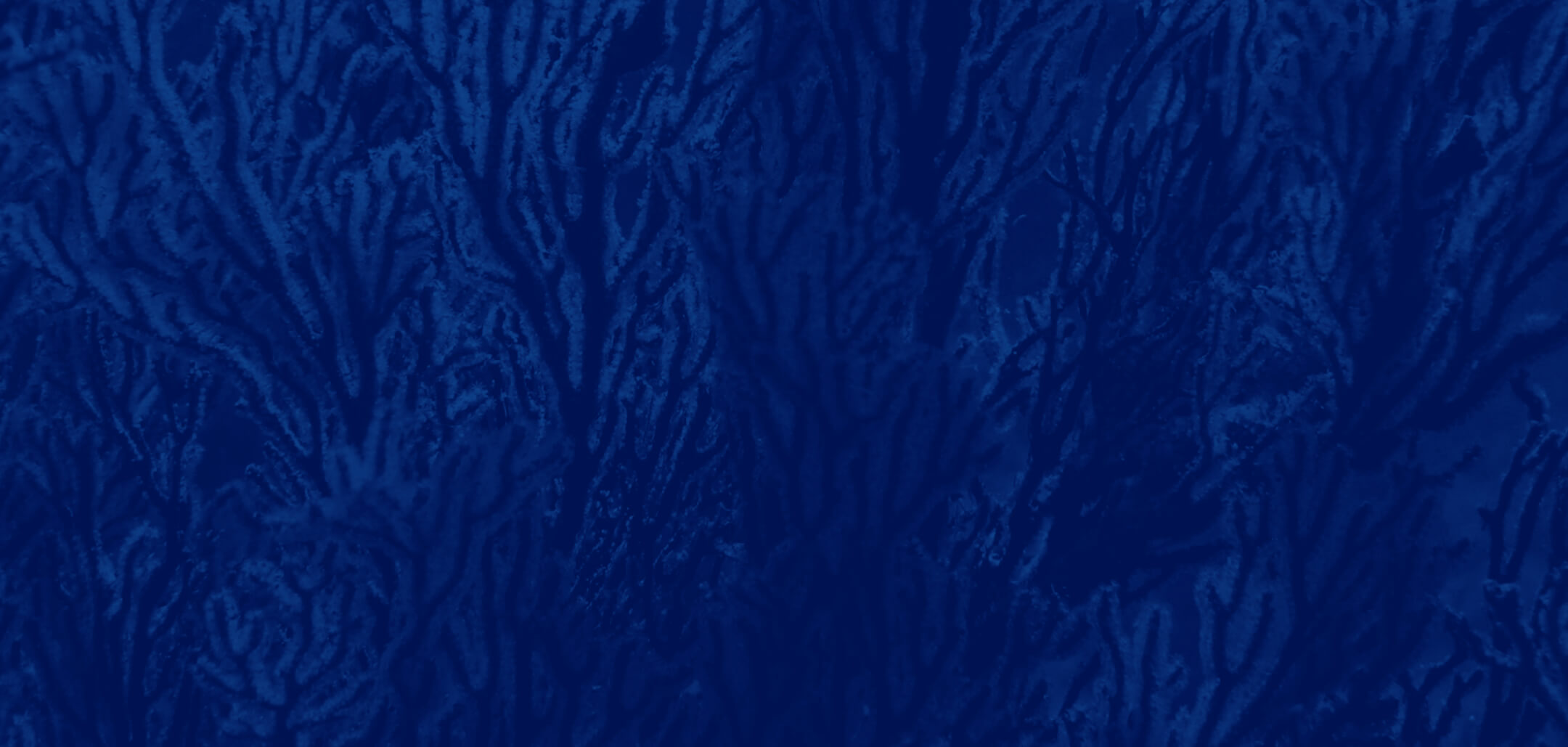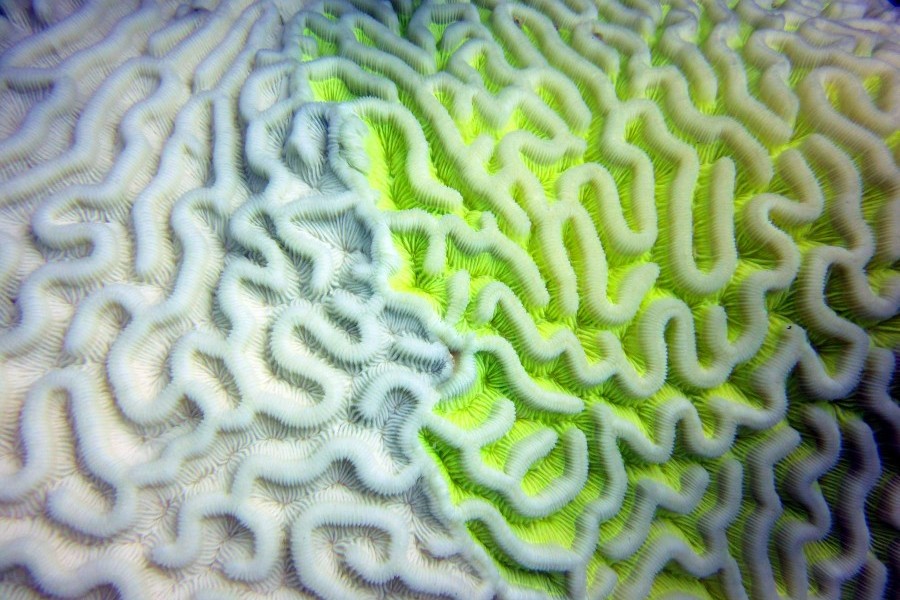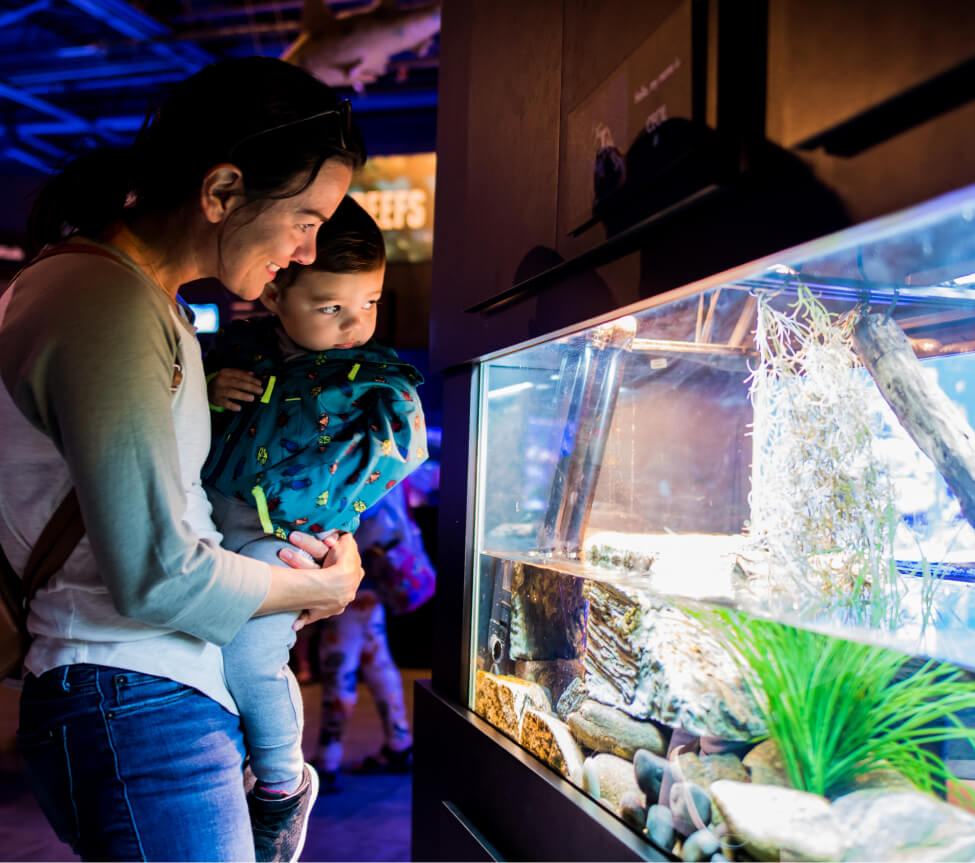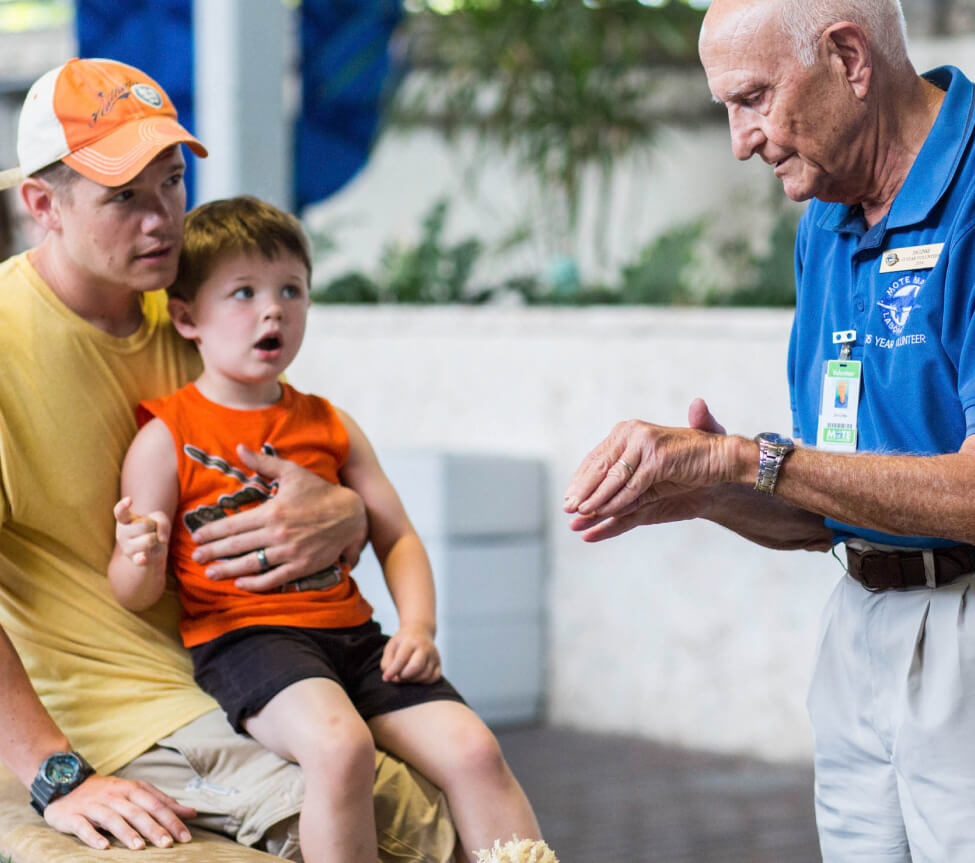The Florida Keys Marine Field Operations program conducts a wide variety of research aimed at better understanding processes and environmental factors that influence coral reef health. This Program also provides support for and collaborates with students and investigators that utilize The Elizabeth Moore International Center for Coral Reef Research & Restoration as a base of operation.
Program Details
- Florida Keys Red Tide Monitoring: Provides early notification of bloom initiation in the Florida Keys region and monitors physical environmental conditions both when K. brevis is present and when blooms are absent. Monitoring includes monthly survey cruises, as well as opportunistic sampling by a volunteer network of commercial fishermen, backcountry guides, researchers and state and federal agency personnel. During bloom events, response efforts aim to conduct more intensive sampling within and near blooms in order to evaluate water quality differences associated with high cell counts (specifically dissolved oxygen) and possible secondary effects on coral reef communities.
- In-Situ Staghorn Coral Propagation and Restoration: The goal of this project is to reverse the population decline of staghorn coral in Florida and the Caribbean by enhancing natural populations through in-situ nursery based propagation and transplantation of nursery grown coral colonies to depleted reef sites. By increasing population numbers using genetically diverse transplanted fragments, the likelihood of successful cross-fertilization between these corals is increased, providing the potential to reverse the population decline of Acropora cervicornis on reefs throughout Florida. Furthermore, the availability of nursery grown staghorn coral to support research will be of critical importance as scientists aim to better understand stressors impacting existing populations of staghorn coral such as disease, predation and bleaching, as well as to provide insight into emerging threats such as global climate change and ocean acidification which will need to be overcome in order to effectively restore this threatened coral species.
- Visitor Support/Marine Operations: Staff from Mote’s Coral Reef Science and Monitoring Program provide support for and collaborate with numerous students and investigators that utilize The Elizabeth Moore International Center for Coral Reef Research & Restoration for conducting marine research each year. Studies include work on coral genetics, coral disease, microbiology, ocean chemistry, fisheries, restoration and ocean acidification.
- Combat Wounded Veterans Challenge – Community-based coral propagation and restoration.
- Florida International University – Influence of coral colony outplant genetic diversity on growth and survival, disease prevalence and spread, coral predator density and colony selection and Symbiodinium composition and density.
- Florida International University – The roles of nutrient enrichment and herbivore pressure in driving algal abundance, coral growth and microbial communities on a coral reef.
- Florida International University – The roles of nutrient enrichment and herbivore pressure in driving algal abundance, coral growth and microbial communities on a coral reef.
- Florida Keys Community College – Marine Data Collection – student fieldtrip.
- Florida Tech – Determining vectors for transmission of coral diseases.
- HBOI – Determining the molecular basis of susceptibility to disease in Floridian corals.
- HBOI – Resistance, Recovery, and Restoration: Assessing Trade Offs in Ecological Strategies of Floridian Corals.
- HBOI – Determining the molecular basis of susceptibility to disease in corals.
- Louisiana Universities Marine Consortium – Undergraduate course in tropical marine biology.
- NOVA Southeastern University – Investigation of genotypic variations in growth rates of Staghorn coral – implications for coral restoration.
- Oregon State University – Experimental assessment of the effects of eutrophication on coral disease prevalence and coral-associated microbe populations.
- Penn State University – Gene expression due to temperature stress in Staghorn coral (Acropora cervicornis) with respect to long-term environmental acclimation and genotypic variation.
- Rollins College – Continued investigation of the white pox disease pathogen, Serratia marcescens.
- Rollins College – Ecology of a Reverse Zoonosis: Human-Environment Interactions in the Transmission, Persistance, and Virulence of White Pox Disease in Elkhorn Coral.
- SCUBAnauts International – Community-based coral propagation and restoration.
- Seaworld – Utilization of rescued corals of opportunity for education.
- Smithsonian Scientific Diving Program – Development of scientific diver training courses to be held in the Florida Keys.
- Smithsonian Field Station – Continued investigation of inhibitors to Porites astreoides coral larvae settlement.
- Tulane University – Water-borne transmission and cross-infection of Aspergillosis in the sea fan Gorgonia ventalina.
- U.S. Environmental Protection Agency – Utilization of rescued corals of opportunity for Quantification of stressor-response relationships in corals.
- U.S. Geological Society – Monitoring coral and algal calcification: understanding spatial and temporal variation in the context of ocean acidification, warming, and water quality.
- University of Buffalo – Coral spawning – collections for ongoing larval research.
- University of Texas – Gene expression in Porites asteroides exposed to prolonged thermal stress.
- University of Texas – Coral spawning: collections for ongoing larval research.
- University of Richmond – Investigation of zooxanthellate sponges in the Florida Keys.
- University of Georgia – Developing remote sensing technology to measure stress/disease in coral.
- University of Georgia – Long-term monitoring of Acropora palmata.
- University of Houston – Gene expression and bacterial changes during the stress response of soft corals.
- University of Miami – Developing and testing methods for the sequencing of coral genomes.
- University of Michigan – Determining cause and effects of shifts from coral dominated to algal dominated reefs.
- University of Michigan – Role of bacterial assemblages in the biomedical use of Ectinascidea turbinata.
- Virginia Institute of Marine Science – How does the gastrovascular system in perforate and imperforate corals affect physiological response to environmental stress?
- Woods Hole Oceanographic Institution – Investigation of fundamental or persistent microbial associates residing within coral tissue involved in nitrogen transformations.
Title: Florida Keys BleachWatch
Primary Investigator: Cory Walter
Collaborators (Name and Institution): Sarah Fangman – NOAA’s Coral Reef Conservation Program
Agency: NOAA (CRCP Program and FKNMS)
Mote Amount: $35,000
Start Date: September 8, 2012
End Date: September 9, 2013
Title: Marine Ecosystem Event Response and Assessment (MEERA)
Primary Investigator: Cory Walter, Erich Bartels
Collaborators (Name and Institution): Florida Keys National Marine Sanctuary
Agency: Protect Our Reefs grant program
Mote Amount: $26,262
Start Date: May 1, 2012
End Date: April 30, 2013
Title: Florida Keys Red Tide Monitoring
Primary Investigator: Cory Walter, Erich Bartels
Collaborators (Name and Institution): FWC – FWRI
Agency: FWC – FWRI
Mote Amount: $23,716
Start Date: July 1, 2012
End Date: June 30, 2013
Ongoing or new funds: Ongoing project – new funds for 2012
Title: Florida Reef Resilience Project (FRRP) – Disturbance Response Monitoring
Primary Investigator: Erich Bartels
Collaborators (Name and Institution): The Nature Conservancy
Agency: The Nature Conservancy
Mote Amount: $20,000
Start Date: August 15, 2012
End Date: October 15, 2012
Ongoing or new funds: Ongoing project – new funds for 2012
Title: Marine Ecosystem Event Response and Assessment (MEERA)
Primary Investigator: Cory Walter, Erich Bartels
Collaborators (Name and Institution): Scott Donahue – Florida Keys National Marine Sanctuary
Agency: Protect Our Reefs grant program
Mote Amount: $25,000
Start Date: May 1, 2013
End Date: April 30, 2014
Title: In situ Propagation and Restoration of Threatened Staghorn Coral (Acropora cervicornis)
Primary Investigator: Erich Bartels
Collaborators (Name and Institution):
Agency: Protect Our Reefs grant program
Mote Amount: $20,500
Start Date: May 1, 2013
End Date: April 30, 2014
Title: Restoring Threatened Corals as Fisheries Habitat in Florida and the U.S. Virgin Islands
Primary Investigator: Erich Bartels
Collaborators (Name and Institution): Caitlin Lustic – The Nature Conservancy, Tom Moore – NOAA Restoration Center, Dave Gilliam – NOVA Southeastern University, Diego Lirman – University of Miami (RSMAS), Ken Nedimyer – Coral Restoration Foundation, Kerry Maxwell – Florida Fish and Wildlife (FWRI)
Agency: TNC-NOAA Community-based Habitat Restoration Grant Program (CRP)
Mote Amount: $48,000
Start Date: June 1, 2013
End Date: December 31, 2014
Title: Florida Keys Red Tide Monitoring
Primary Investigator: Cory Walter/Erich Bartels
Collaborators (Name and Institution): FWC – FWRI
Agency: FWC – FWRI
Mote Amount: $28,000
Start Date: July 1, 2013
End Date: June 30, 2014
Ongoing or new funds: Ongoing project – new funds for 2013-14
Title: Florida Keys BleachWatch
Primary Investigator: Cory Walter
Collaborators (Name and Institution): NOAA-CRCP
Agency: NOAA/FKNMS
Mote Amount: $18,000
Start Date: September 9, 2013
End Date: September 8, 2014
Ongoing or new funds: Ongoing project – new (reduced) funding for 2013-14
Florida Keys BleachWatch
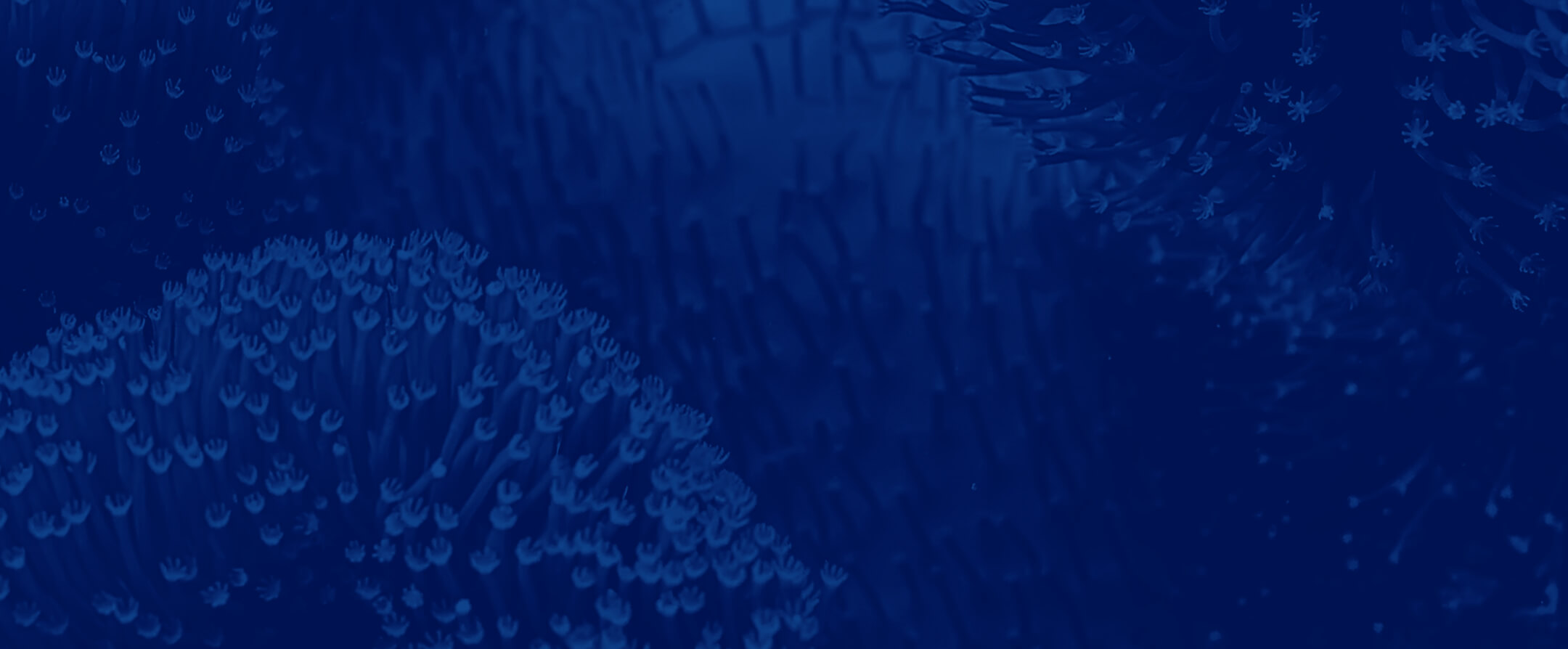
Florida Keys Marine Field Operations Program Team
Additional Program Information
- Kenkel, C. D., Goodbody-Gringley, G., Caillaud, D., Davies, S. W., Bartels, E. and Matz, M. V. (2013), Evidence for a host role in thermotolerance divergence between populations of the mustard hill coral (Porites astreoides) from different reef environments. Molecular Ecology, 22: 4335–4348.
- Vaughan, D. and E. Bartels (2012). Coral Propagation can produce large numbers of coral transplants, In: Kruczynski, W. L. and P. J. Fletcher(eds.). 2012. Tropical Connections: South Florida’s marine environment. IAN Press., University of Maryland Center for Environmental Science, Cambridge, Maryland. 492 pp.
- C. V. Palmer, E. S. McGinty, D.J. Cummings, S. M. Smith, E. Bartels, and L. D. Mydlarz (2011) Patterns of coral ecological immunology: variation in the responses of Caribbean corals to elevated temperature and a pathogen elicitor. Journal of Experimental Biology 214:4240-4249
- Johnson, M. E., C. Lustic, E. Bartels, I. B. Baums, D. S. Gilliam, L. Larson, D. Lirman, M. W. Miller, K. Nedimyer, S. Schopmeyer. (2011) Caribbean Acropora Restoration Guide: Best Practices for Propagation and Population Enhancement. The Nature Conservancy, Arlington, VA.
- Schopmeyer, S. A., Lirman, D., Bartels, E., Byrne, J., Gilliam, D. S., Hunt, J., Johnson, M. E., Larson, E. A., Maxwell, K., Nedimyer, K. and Walter, C. (2011), In Situ Coral Nurseries Serve as Genetic Repositories for Coral Reef Restoration after an Extreme Cold-Water Event. Restoration Ecology.
- Lirman, D., Schopmeyer, S., Manzello, D., Gramer, L. J., Precht, W. F., Muller-Karger, F., Banks, K., Barnes, B., Bartels, E., Bourque, A., Byrne, J., Donahue, S., Duquesnel, J., Fisher, L., Gilliam, D., Hendee, J., Johnson, M., Maxwell, K., McDevitt, E., Monty, J., Rueda, D., Ruzicka, R., Thanner, S. (2011) Severe 2010 Cold-Water Event Caused Unprecedented Mortality to Corals of the Florida Reef Tract and Reversed Previous Survivorship Patterns. PLoS ONE 6(8): e23047.
- Shank, G. C., R. Lee, A. Vähätalo, R. G. Zepp, E. Bartels (2010) Production of chromophoric dissolved organic matter from mangrove leaf litter and floating Sargassum colonies. Marine Chemistry 119:172–181
- Shank, G. C., R. G. Zepp, A. Vähätalo, R. Lee, E. Bartels (2010) Photobleaching kinetics of chromophoric dissolved organic matter derived from mangrove leaf litter and floating Sargassum colonies. Marine Chemistry 119:162–171
- Zepp, R. G., G. C. Shank, E. Stabenau, K. W. Patterson, M. Cyterski, W. Fisher, E. Bartels, S. Anderson (2008) Spatial and temporal variability of solar ultraviolet exposure of coral assemblages in the Florida Keys: Importance of colored dissolved organic matter. Limnology and Oceanography. 53(5): 1909-1922.
- J. M. Cervino, F. L. Thompson, B. Gomez-Gil, E. A. Lorence, T. J. Goreau, R. L. Hayes, K. B. Winiarski-Cervino, G. W. Smith, K. Hughen, E. Bartels (2008) The Vibrio core group induces yellow band disease in Caribbean and Indo-Pacific reef-building corals. Journal of Applied Microbiology. 105(5): 1658 – 1671.
- Neeley, M. B., E. Bartels, J. P. Cannizzaro, K. L. Carder, P. Coble, D. English, C. Heil, C. Hu, J. Hunt, J. Ivey, G. McRae, E. Mueller, E. Peebles, and K. Steidinger (2004). Florida’s black water event, In: Harmful Algae 2002, Steidinger et al., eds., Proceedings of the Xth International Conference on Harmful Algae, Florida Marine Research Institute, Florida Institute of Oceanography, UNESCO, St. Petersburg, FL, pp. 377-379.
- Stabenau, E., R. G. Zepp, E. Bartels, and R. G. Zika (2004) Role of seagrass (Thalassia testudinum) as a source of chromophoric dissolved organic matter in coastal south Florida. Marine Ecology Progress Series. 282:59-72.
- Hu, C., F. E. Muller Karger, Z. Lee, K. L. Carder, B. Roberts, J. J. Walsh, C. Heil, P.G. Coble, K. Steidinger, G. McRae, R.H. Weisberg, R. He, E. Johns, T. Lee, B. Keller, N. Kuring, J. Cannizzaro, J. Ivey, G. A. Vargo, R. G. Zepp, J. Boyer, R. Jones, G. Kirkpatrick, R. P. Stumpf, E. Bartels, E. Mueller, R. Pierce, J. Culter and J. Hunt (2002) Satellite images track ‘black water’ event off Florida coast. EOS. 83(26):281 285.


